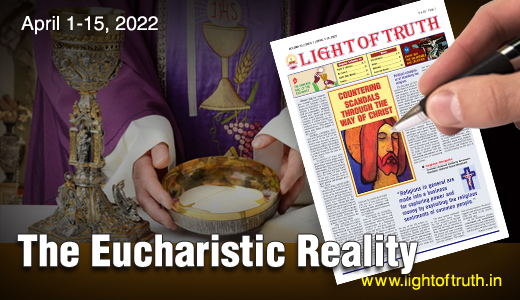Azadi ka Amrit Mahotsav Kolkata event honours four Clergymen
Pope Francis asks businesses to support working women: They’re ‘afraid to get pregnant’
Study: Christianity may lose majority, plurality status in U.S. by 2070
Indian politician declines Magsaysay Award under party pressure
Like John Paul II, Pope Francis heads to Kazakhstan during time of war

The Gospel of Jesus is not a Gospel for the Church or its members alone, but Good News for the world: Dietrich Bonhoeffer wrote, “The church as the one community of Lord Jesus Christ, who is Lord of the world, has the commission to say his Word to the whole world. The territory of the one Church of Christ is the whole world.” Bonhoeffer’s conception of truthfulness is not simply rooted in a situation but instead “is determined by the understanding of reality. Reality is determined by not only what is out there but by our relation to what is out there. It is not the situation but instead reality that determines ethical action, arguing that reality is not only what is ‘out there’ but also our relation to what is ‘out there.’” … “There are not two realities, but only one reality, and that is God’s reality revealed in Christ in the reality of the world.” The Church shouldn’t flee from the human world, but instead “engage it with God at his strongest point.
‘Reality is the sacrament of the ethical command. William T. Cavanaugh presents a rich description of the Eucharist as that true sacrifice to God that makes the Church into Christ’s body, thereby constituting the true res publica. Cavanaugh’s Torture and Eucharist is a theological study of the Catholic Church in Chile during the military dictatorship of Augusto Pinochet from 1973–90. The book might appear to be an exercise in relating liturgy to ethics, or liturgy to politics, he strongly resists describing his project in this way. Liturgy must be ‘applied’ or made relevant to political life and ethics. The separation of religion and politics remains intact.
“Torture may be considered a kind of perverse liturgy, for in torture the body of the victim is the ritual site where the state’s power is manifested in its most awesome form. Torture is liturgy — or, perhaps better said, ‘anti-liturgy’ — because it involves bodies and bodily movements in an enacted drama which both makes real the power of the state and constitutes an act of worship of that mysterious power… The liturgy of the torture room is a disciplina arcani, a discipline of the secret, which is yet part of a larger state project which continues outside the torture chamber itself.” For Christians, the principal practice by which the moral imagination is formed, the principal form of discipleship training is worship. Each aspect of worship represents a vital dimension of moral formation. The Eucharist anticipates the realisation of a new society, a new politics.
The Indian society is saturated not with violence but with religious fundamentalism. Do we try to create spaces of resistance to religious fundamentalism or involve ourselves in yet another form of it – Christian fundamentalism? Do we create movements, which used public ritual acts of solidarity outside sites of symbolic importance situations of communal divide? Banners would be unfurled by groups, often including clergy and members of religious orders, who would sing and recite litanies that will promote religious friendship and fraternity. The truth is not something that rests in itself and for itself, but is something that happens between two persons. The truth of God is thus tied to relationship, not to ideas or principles. How then can Christians communicate with the world?
How do we speak of God—without religion, i.e. without the temporally conditioned presuppositions of metaphysics, inwardness? How do we speak in a “secular” way about “God”? About the meaning of reconciliation and love for the benefit of believers of other religions? We rarely dare to speak and create mutual respect and friendship. Fundamentalist behaviour is in the long run an unsuccessful attempt at backward-focused rebellion against social alienation, ethno-cultural dislocation, world view homelessness and societal disintegration of the values of modernity and of post modernity. Fundamentalism is a flight into radicalism, and it is often combined with violence, while refusing to accept an adequate perception of reality, of rationality, and of the unfolding of freedom for the individual and society. Religion has a dubious reputation. It can be a source of love and peace, but it can also be a source of hate and war. The afflictions of fundamentalism emerge wherever foundations break to pieces, which we as people find to be as necessary as daily bread in our respective struggles for existence. Religion of love and its liturgy must create a social milieu of respect and relation instead of hostility and anger. The social reality must be seen as the sacrament of the ethical command of Jesus.
Leave a Comment